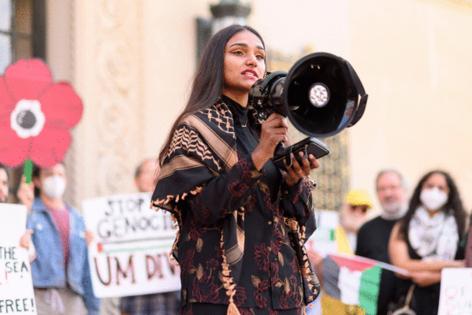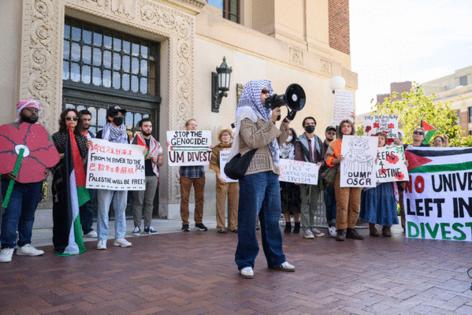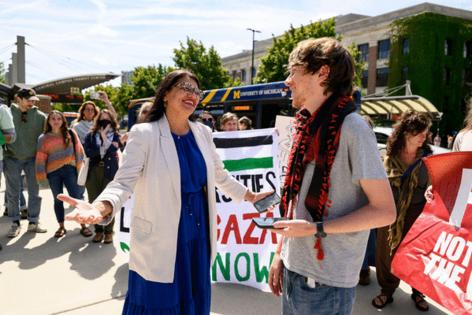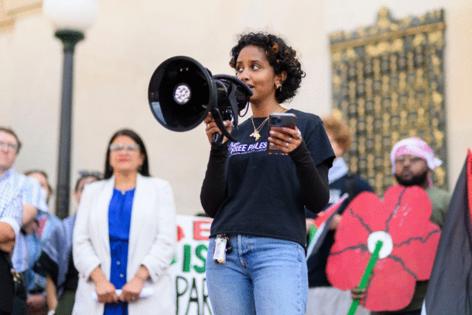Tlaib, pro-Palestinian protesters claim unfair treatment by UM. Officials demand civility
Published in News & Features
ANN ARBOR, Mich. — U.S. Rep. Rashida Tlaib called out University of Michigan leaders on Wednesday for what the Detroit Democrat called the "deepening campaign of anti-Palestinian repression," though university leaders said they welcome civil demonstrations and behavior.
Speaking through a megaphone to dozens of supporters on campus, Tlaib said UM's Board of Regents has tried to silence the campus movement calling for the board to divest from Israel. University officials, including the regents, have maintained they have no plan to do so and that the university has no direct investment in any Israeli company. Officials said indirect investments amount to less than 1% of the university's reported $17.9 billion endowment.
“Thank God my son decided not to go to this university, because I know if he was at this campus, the regents, the president, the leadership of this university would be targeting him and targeting his rights,” Tlaib shouted into a megaphone.
A portion of students, faculty and community members spent much of 2024 protesting the university's investment amid the Israel-Hamas war in Gaza that began in October 2023 after a Hamas attack on Israel.
Protests on campus have been met with arrests, university disciplinary action and since-dropped charges from the Michigan Attorney General Dana Nessel's office. The board approved a set of speech principles in January 2024 that noted that "Our deep commitment to free expression does not extend to speech or conduct that violates the law or University policy, including targeted speech that involves bullying, defamation, destruction of property, harassment, violence, or threats."
But the attempts to quash the protesters are still ongoing, Tlaib said in a press release, and the press conference was held to bring attention to the UM Office of Student Conflict Resolution's charging of students this summer with disciplinary violations for the encampment on the UM Diag and other protests in 2024.
Liz Jacob, a fellow at the Sugar Law Center for Social and Economic Justice, claimed UM treats students rallying in the streets, "lighting couches on fire" and screaming "Go Blue" with a double standard than when they protest the war in Gaza. Sugar Law has filed three lawsuits on behalf of UM protesters claiming violations of free speech or due process, Jacob said.
Regent Sarah Hubbard, a Republican from Okemos, said Tlaib is always welcome on campus, but there were campus rules Hubbard hoped Tlaib was "mindful of."
Hubbard added she didn't feel the board was "repressing" the Pro-Palestinian protestors.
"I’m focused on making sure our campus is open for all speech, as long as that speech follows the rules of time, place and manner," she said. "If they are following the rules, I have no problem, but disruptions of events or campus activities are not allowed under our rules."
Why Tlaib held the event
OSCR-disciplined former graduate student and encampment participant Michael Mueller spoke on the sidewalk adjacent to campus, organizers said, because he is banned from setting foot on school grounds.
"Repression from U of M, from the state, reflects that these institutions are using any means necessary to maintain their profit from the ongoing genocide of the Palestinian people," Mueller said at the protest.
Eaman Ali, a recent UM alumnus, said she received notice two months after graduation from the university office of “disrupting university operations, failing to comply with requests to leave university-controlled premises, and physically threatening harm to the U of M community" in connection to protests on May 3 and Oct. 7, 2024. She claimed the office's desired outcome was to ban her from re-enrolling in any UM programs in the future.
“This was despite the fact that just four months ago, while I was a student employee, University of Michigan Human Resources fired me and several others from our campus employment, and additionally banned us from ever being rehired at the university” for the May 3, 2024 protest, Ali claimed.
The press conference coincided with the first week of classes and pro-Palestinian activist Mahmoud Khalil's visit to the UM campus the same day.
The press conference also happened on the same day as the annual Festifall event, when students explore campus and community organizations they may join. Last year, four non-students were arrested at Festifall for participating in a three-hour-long "Die In" to bring awareness to the Israel-Hamas war, UM's student newspaper, the Michigan Daily, reported.
Tlaib said she decided to hold the Wednesday news conference because it's the first week of school and in response to student concerns. She said some of the concerns came from students who interned for her office.
“They’re doing nothing wrong in saying, ‘End the support of the genocide.’ They are trying to save lives," she said.
'Civil behavior' expected
Interim UM President Domenico Grasso mentioned the prior discontent on campus and affirmed the university's support of what it considers to be "civil" protests and conversation in a statement last week.
"As we begin the new academic year, I want to share my expectations for civil behavior," Grasso's statement read. "Robert Frost, who once taught at Michigan, reflected on the aphorism, 'Good fences make good neighbors.' The common interpretation of this metaphor is especially helpful for our campus community: clear boundaries help safeguard mutual respect and build trust.
"What is not acceptable on campus are actions that damage property, disrupt operations and events, deny access to facilities or public commons, and physically threaten or harm others, including public safety officers. As president, it is my responsibility to ensure the safety of all students, staff, faculty, patients, and visitors, as well as the security of our facilities and open spaces."
Rabbi Asher Lopatin, community relations director at the Jewish Federation of Greater Ann Arbor, said he agrees with Grasso's statement.
"We want to hear all voices, and no one's should be stifled," Lopatin said. "But no one's spaces or ceremonies should be interrupted," referring to a pro-Palestinian demonstration at the 2024 honors convocation that cut the event short.
"We want everyone to be safe," he added.
After Wednesday's protest, Tlaib tried to enter the administration building to meet with Grosso for discussions on divestment from Israeli companies. She tried to set up a meeting with the interim president's chief of staff along with five students.
Tlaib was told Grasso wasn't in, and the congresswoman tried to schedule a meeting with the chief of staff that would include five student protesters, but the request was rejected, said protester Kathleen Brown, a member of the Graduate Employees Organization AFT Local 3550.
"So we walked away without a meeting and without student and staff representation at that meeting," Brown said.
Asked about Grasso's comments, Mueller put the onus for peace back on the university.
“We want to end the genocide, and that is about what we’re trying to do. So it’s not a question of who is peaceful and who is not — it’s really the university that is at fault for any violence," Mueller said.
Israel has rejected claims that it is committing genocide by noting it has targeted a terrorist group in Hamas in self-defense and tried to minimize civilian casualties as Hamas militants have hidden among the populace in Gaza.
No high-profile Pro-Palestinian protests have taken place on campus in 2025, Hubbard said, besides the blooms of peony plants being cut at the Nichols Arboretum. One-third of the plants were vandalized, and papers with pro-Palestinian messages were left behind, campus police said in June.
_____
_____
©2025 The Detroit News. Visit detroitnews.com. Distributed by Tribune Content Agency, LLC.














Comments